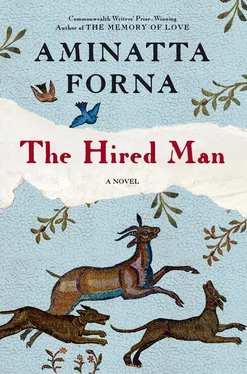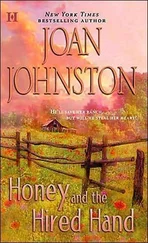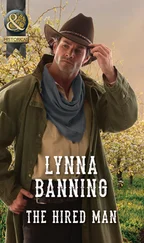‘But how does she find her way around?’
‘She knows the roads, the fields and the hills. She has lived here since before you were born.’ At that moment Kos jumped a ditch and ducked the wire into a field. I explained to Grace, ‘For instance, she knows that there, right after the bend in the road, there is a good place to cross into the field where she might pick up the scent of a rabbit. She’d never catch one, but it makes life more interesting. And further ahead where there’s loose gravel on the road, that means we’re nearly home. She relies on what she feels and smells. Sometimes on Zeka, who she follows. Sometimes on me.’
At the next bend Grace said, ‘I’d better go home. Mum’s made lasagne.’
‘See you tomorrow,’ I said.
Grace turned to go and then turned back. ‘Why don’t you come and have supper with us? I bet Mum won’t mind.’
‘Another day,’ I told her. ‘Kos and Zeka want their run.’
‘You can come on the way back.’ Despite her insistence, I shook my head. The last few days, Conor’s visit, had changed things. I wanted my own company again.
‘I’ll see you tomorrow.’
‘Yeah, sure. ’ She rubbed the toe of her shoe on the surface of the road, her head bent.
‘Are you OK, Grace?’
She looked up, shrugged. ‘Yes,’ she said and made the strange little humming sound which meant she was unhappy. I watched her go, I called her name. She stopped and turned.
‘Maybe we go to the coast soon to find tiles for your fountain, yes?’
She nodded, smiled briefly and ran on.
Kos came to me after I returned home from the islands. I’d been gone ten years by then. I’d missed my last two years of technical school and my chance for college, if I’d ever wanted it. A year working on my uncle’s boat and then military service. The first year I was based in Vojvodina. Flat fields of corn and wheat, where the snow covered the ground many months of the year. We trained shirtless and the barracks had little heating. For R&R we went to Novi Sad, where there was a theatre that played entirely in Hungarian, and where I once spent an evening escaping the cold and my drunken comrades. That’s what I remember most. When that was over I reapplied to stay in the Army three years more. I exchanged the plains of the north for the fruit groves of the south. After that I didn’t go back to live in Gost, instead I went to the islands, of which I had heard so much. People had told me there was a good life to be had there and besides I no longer felt any desire for Gost, I’d changed that much.
The Army changed me.
In that place strength was everything: if you lacked backbone you faked it, and if you couldn’t do that you made sure never to catch anyone’s eye in case they chose to make something of it. I’d always had some degree of self-control, but now I gained a new command of myself. Restraint was the way. There were bullies and their victims, and then there were the rest of us. In the Army there was nothing you could do to help the ones who were picked on. Some of them even seemed to enjoy the humiliation. A few learned to stand up for themselves. That worked if it happened soon enough, before the pack had its claws into you. Or you could go your own way. One guy spent the entire time playing a little tin flute. When it was stolen he produced another one. When someone took that one, he came up with another, like a magician (he had a box full of them somewhere). He never said a word, never commented that they kept disappearing and in the end whoever had it in for him decided to leave him alone. One or two guys managed to pull on whatever strings they had on the outside. The rest of us waited it out. You did what you had to to survive.
I wrote to Anka through Danica, but Krešimir rifled Anka’s belongings and showed my letters to Vinka. There was trouble. Danica wrote saying things were impossible. For Danica’s sake, for Anka’s sake, for my own sake, I stopped writing. The last letter from Anka came several months later, a bundle of letters in her round schoolgirl hand, written over the weeks. I kept them the whole year I was in Vojvodina and then when the time came to move on, I burned them. That’s how much I had changed.
I changed in order to survive. You could even say I did well. I stayed on in the Army. And yet, even in those years, Krešimir infected things. The one part of me I failed to suppress was still at war with Krešimir. I couldn’t stand to give him the satisfaction of knowing I grieved and I went on this way for years: joining the Army, staying away. I did it to spite Krešimir; he retained his grip on my imagination and in that way I’d become his creation.
Sage and rosemary, boat diesel, decayed fish, cooking oil, a salt breeze: the coast smelled of these. Work was easy to find. For a while I waited tables where I learned English, also Italian and French. I discovered a talent for languages. I made extra money translating menus, advertisements and brochures. I could have made more money doing that kind of work, but I enjoyed café life, the foreigners, the comings and the goings. The boss asked me to give his son English lessons and I did. We read English books together, books left on tables by the tourists. Most were trash, some were good. After a while I grew bored. I moved islands and went back to the boats.
Anka no longer wrote, or if she did the letters went to an address from which I’d long gone. Nothing was forwarded.
Life on the boats suited me. I liked the early mornings, the silence, the days that passed in a blaze of light, the purity of the blue skies and of the darkness that followed, summer storms, the sound of rain on the sea. At one point I worked an old ketch — I told you — in Hvar; we used to take the tourists on a tour of the smaller islands and stop for swimming and snorkelling. Mornings I rose ahead of the others to ready the boat, hose down the decks, prepare the ropes and the rig although the skipper rarely bothered with anything but the motor. After one season I’d had enough of that life, too. I craved my own company. I spent my savings on a small boat and joined the water taxis ferrying passengers to the various beaches. This way of being suited me. If I didn’t want to talk I pretended I didn’t understand what my passengers were saying. The tourists forgot their books, suntan oil and sunglasses just as they did in the restaurants and in my lunch hour I read. I motored up and down the same stretch of water and dreamed of a life: a shepherd’s hut, cliffs. I sold the boat, hitched to Zadar and took a ferry over to the island of Pag. Pag was everything I had been searching for. I found a cottage surrounded by sandy, salt-soaked, barren earth with no road leading to it, only a small slipway and a boat. Salt corroded everything, even the rocks. I planted basins of tomatoes, made a pair of beehives and kept bees; they feasted on the sage, which grew everywhere.
Tuesday I raised my fist to knock on the door of the blue house: inside I heard Grace and Laura.
‘Nowhere near here, darling.’
‘Where then?’
‘Much further away. Where there were Muslims. It’s not even the same country any more. None of those sorts of things happened here, or we would never have bought this house. Think about it. Anyway, it was for ever ago. You were only just born, it’s all long forgotten now.’
I knocked. Laura turned round. ‘Here’s Duro. Ask him if you don’t believe me.’
‘What do you want to know?’
‘Grace has been filling her head with all sorts of things. I’m just saying there was never any fighting here, it was all far, far away. In another country. These are decent, good people, you’ve met them yourself.’
Grace didn’t reply. She looked at me. I said without hesitation, ‘Gost is a safe place. You have nothing to worry about.’
Читать дальше












